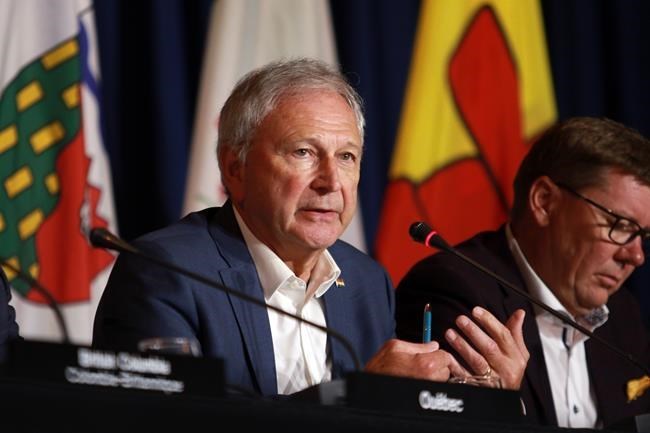FREDERICTON — New Brunswick’s report on systemic racism does not include a call for an Indigenous-led public inquiry — a recommendation that has been repeatedly called for by Indigenous leaders and that was included in a draft version of the report.
Manju Varma, the commissioner appointed to examine the extent and scope of systemic racism in New Brunswick, released a report Friday with 86 recommendations.
Following its release, Chief Allan Polchies Jr. of St. Mary’s First Nation said that the province “heard a loud cry from Indigenous voices two years ago to address systemic racism, and our calls were ignored.”
“We put forward a detailed framework for an Indigenous-led inquiry into systemic racism and the premier came back with an in-house study. Now, we are at the same point we were two years ago, standing and waiting for action,” Polchies said Friday in a statement released by New Brunswick's Wolastoqey Nation.
Indigenous leaders across the region called for a public inquiry in June 2020, when Tla-o-qui-aht First Nation woman Chantel Moore and Metepenagiag First Nation man Rodney Levi were shot by RCMP just days apart. Instead, the province appointed Varma in September 2021 to "develop an understanding of the nature and impact of systemic racism in New Brunswick" and produce a final report in 2022.
In June 2022, a group representing New Brunswick’s nine Mi’kmaq communities publicly released a draft version of the report that they had received, which recommended the creation of an Indigenous-led public inquiry. The chiefs accused the province of suppressing the report's contents and called on Premier Blaine Higgs to scrap the commissioner's office because they said it lacked independence. Around that time, a senior policy adviser with the commission resigned and claimed “external forces” were limiting what the office could say.
Wolastoqey Nation said in a statement earlier this week that if the report recommends “anything less than an actual Indigenous-led inquiry to address systemic racism, then this drawn-out process will have been a failure.”
Polchies said Friday a public inquiry is essential in order to compel information and witnesses from a government “infamous for its secrecy.”
Varma told reporters Friday that she considered recommending a public inquiry in her report — but ultimately decided instead to call for “a task force focused on dismantling systemic racism in New Brunswick policing.”
“That recommendation looks at the justice system, the policing system, the mental health system,” she said.
“I think at this moment it provides a more global response than an inquiry could to those very tragic deaths,” Varma added, referring to Moore and Levi.
When asked why the recommendation for a public inquiry was removed between the draft and final report, Varma said the version of the report released publicly this summer was one of “several” drafts and that changes were made throughout the process as new feedback, experiences and suggestions were shared with the commission.
She did not say specifically what new information led to the public inquiry recommendation being removed.
“In the end I have come up with 29 recommendations that specifically address the needs of First Nations people,” Varma said.
Robert Tay-Burroughs, the senior commission adviser who resigned in June, said in an interview Friday that he is disappointed but not surprised by the report. "I think this report is a reflection of what the commissioner was allowed (by the provincial government) to say," he said.
An adequate provincial response, Tay-Burroughs said, would include a public inquiry and "recognition that the single greatest act of systemic racism in New Brunswick has been the wholesale theft of Indigenous land by the Crown."
A draft version of the report recommended that the provincial government initiate a process to return land to the Mi’kmaq and Wolastoqey that was improperly possessed by pre- and post-Confederation governments. This recommendation was also omitted in the final report.
The report's 86 recommendations include removing racist terms from provincial locations, collecting race-based data in health care, and educating elected officials on the meaning of systemic racism.
“I am concerned about the lack of understanding about systemic racism at leadership levels in both public and private entities," Varma said.
Also included are recommendations to simplify access to provincial services for new immigrants and to rescind the provincial directive restricting land acknowledgments. New Brunswick government employees have been ordered to stop making territorial or title acknowledgments in reference to Indigenous lands — a decision the province said is due to a series of legal actions and land claims initiated by First Nations.
The province first announced it would commission a report on racism in March 2021.
This report by The Canadian Press was first published Dec. 16, 2022.
By Lyndsay Armstrong in Halifax.
---
This story was produced with the financial assistance of the Meta and Canadian Press News Fellowship.
The Canadian Press



